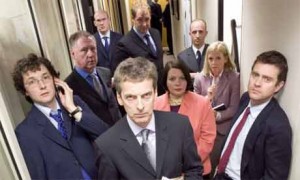[revision] the thick of it vs. the west wing
Each week “Revision” holds two TV shows up to the light to figure out if they are friends or foes.
Politics has always been a murky area of knowledge for me. So naturally, I turn to TV for education. But how much can narrative shows really tell us about the real world? Great shows (The Wire) have the knack of making us believe that their version of reality is so close to the real thing that we almost feel educated by it.
The West Wing (premiered on NBC in 1999, a pet project of Aaron Sorkin, writer of The Social Network and currently The Newsroom) never convinced me that its version of White House life was anything close to the real one. More often than not I was yelling at my screen “that’s not how it works!” Sure, every episode at least one character will be slapped hard in the face by reality and be forced to sacrifice their ideals for the greater good of the party, or the United States, or their hyperintelligent guru of a President. But always, the characters emerge with dignity, the advisors to President Bartlett live to fight another day. Sorkin gives Martin Sheen a smug little speech to wrap up the episode with, and hey presto! A neat little moral message to bookend every 42 minutes of fast wits and faster walking.
Yeah, it’s hard not to be cynical about West Wing, but it doesn’t really present itself as a realistic portrayal of American politics. It’s network television, so it’s sleek, and it’s goddamn entertaining. When Sorkin is on point, his dialogue is hilarious (minus the didactic speeches). But as a show about politics? It’s pure fantasy. But maybe that’s what the public needed back then. Maybe it’s what they need now. A little voice saying “hey, not every politician is so bad.” A piece of inspiration that promises that there is someone out there fighting the good fight, who isn’t in it for the power or glory but for the good of the people. Because that’s what we’d all like to be the reality, right?
The Thick of It makes no effort to sugarcoat the shit-spoonful that it believes politics is. A BBC comedy that has since spawned a spin-off film (In the Loop) and a U.S. remake (Veep), the show roots about in the muck of ground-level politics. Political decisions are only ever made with public perception in mind—forget about the inspirational oratories of the idealists in the Bartlett administration—and anyone who doesn’t immediately bow to the desires of the powers-that-be is immediately disembowelled by the party’s “enforcer” – a whippet-thin, Scottish-accented maelstrom of abuse played by an absolutely phenomenal Peter Capaldi. Seriously, if you haven’t seen this show, it’s worth watching if only to learn a plethora of new ways to implement the word “fuck”. Good swearing is an art, and The Thick of It is the Sistine Chapel of coarse language.
In other words, in The Thick of It, politics is ugly. All the staff—politicians, advisors, journalists—are personally despicable and devoid of any morals. Most episodes will challenge characters with a situation that places their political interests directly at odds with their personal beliefs, but unlike in The West Wing wherein characters will nobly fight to the end for what they believe in, these Brits wilt meekly and find themselves inevitably incapable of upholding any ethics at all. Most importantly, though, The Thick of It is pointless. Government, it seems, is pure politics. Internal disputes and public relations gaffes that are so minor and arbitrary that you have to laugh. Because the alternative (if the show is accurate) is to acknowledge that the people leading us aren’t thinking about us at all. They don’t care. They spend every minute of every day grasping at power with everything they have; only when making positive social change happens to align with their personal interests do politicians get anything done on our behalf. Or so argues The Thick of It, anyway.
I am inclined to believe that The Thick of It is the more realistic show, if only because it is so much more cynical (it’s documentary style doesn’t hurt either), and doesn’t have me snorting indignantly every five minutes like The West Wing does. But does it make better television? Yes, yes it does. Because the reality is that democracy is a messy process, and, especially in its current incarnation, is an unholy beast that often is completely at odds with the population it is nominally designed to serve. And why try to protect us from that? The West Wing must have been a sweet fantasy for left-wing Americans looking to escape from Bush Jr.’s administration, but maybe being confronted with—and made to laugh at—something closer to the bone would have been healthier? Perhaps it could have inspired anger and action, rather than the pacification that comes with swallowing the cultural valium that is The West Wing, which glibly presents a happy parallel universe in which politicians are working tirelessly for the greater good.
And that is the difference between good and great TV. One is simply entertainment, challenging only in the mildest way. And the other is brave, confronting, and difficult when it needs to be. Go watch The Thick of It, and you’ll see what I mean.



What do you have to say about House of Cards?
I’ve loved watching the stripped-down interpersonal politics HoC presents, and have found it refreshingly un-American (in the sense that there are no Harrison-Ford-hanging-onto-a-flaming-Air-Force-One-by-his-fingertips scenes). It’s potentially the In the Thick of It-inspired version of The West Wing we’ve all been waiting for!